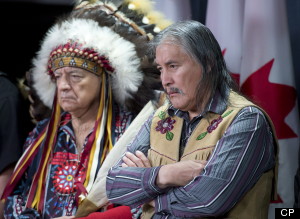OTTAWA - Prime Minister Stephen Harper's decision to prorogue Parliament has apparently forced a United Nations official to change his travel plans.
James Anaya, the UN special rapporteur on the rights of indigenous peoples, was supposed to visit Canada between Oct. 12-20.
But Anaya's office has told First Nations groups that his visit has been rescheduled to Oct. 7-15 to accommodate the new parliamentary session, which resumes Oct. 16.
"The government of Canada informed the special rapporteur that it was changing the dates to accommodate the session of Parliament," an Anaya aide said Tuesday in an email to aboriginal groups.
"In order to avoid further delays or cancellation of the visit, the special rapporteur has agreed to the new dates."
Anaya first requested permission to make an official visit to Canada in February 2012.
It is not clear why his trip has been rescheduled for a time when Parliament is not sitting. Calls and emails to Anaya and his spokeswoman, as well as to a spokeswoman for Aboriginal Affairs Minister Bernard Valcourt, were not immediately returned.
The UN special rapporteur is responsible for promoting laws and policies that support indigenous peoples around the world.
He is also tasked with researching their living conditions and issuing reports and recommendations.
The rapporteur has no binding authority. Rather, he aims to shame governments into action by bringing unacceptable conditions to light.
"The aim of the special rapporteur's visit to Canada is to examine the human rights situation of the indigenous peoples of the country," says a notice on Anaya's website.
"During the visit, the special rapporteur will hold meetings and consultations with government officials, as well as with indigenous nations and their representatives in various locations."
The federal government will get a chance to respond to Anaya's findings before a final report is circulated and presented to the United Nations Human Rights Council.
The report will include recommendations for the federal government, First Nations and possibly other groups.
Original Article
Source: huffingtonpost.ca
Author: Steve Rennie
James Anaya, the UN special rapporteur on the rights of indigenous peoples, was supposed to visit Canada between Oct. 12-20.
But Anaya's office has told First Nations groups that his visit has been rescheduled to Oct. 7-15 to accommodate the new parliamentary session, which resumes Oct. 16.
"The government of Canada informed the special rapporteur that it was changing the dates to accommodate the session of Parliament," an Anaya aide said Tuesday in an email to aboriginal groups.
"In order to avoid further delays or cancellation of the visit, the special rapporteur has agreed to the new dates."
Anaya first requested permission to make an official visit to Canada in February 2012.
It is not clear why his trip has been rescheduled for a time when Parliament is not sitting. Calls and emails to Anaya and his spokeswoman, as well as to a spokeswoman for Aboriginal Affairs Minister Bernard Valcourt, were not immediately returned.
The UN special rapporteur is responsible for promoting laws and policies that support indigenous peoples around the world.
He is also tasked with researching their living conditions and issuing reports and recommendations.
The rapporteur has no binding authority. Rather, he aims to shame governments into action by bringing unacceptable conditions to light.
"The aim of the special rapporteur's visit to Canada is to examine the human rights situation of the indigenous peoples of the country," says a notice on Anaya's website.
"During the visit, the special rapporteur will hold meetings and consultations with government officials, as well as with indigenous nations and their representatives in various locations."
The federal government will get a chance to respond to Anaya's findings before a final report is circulated and presented to the United Nations Human Rights Council.
The report will include recommendations for the federal government, First Nations and possibly other groups.
Original Article
Source: huffingtonpost.ca
Author: Steve Rennie

No comments:
Post a Comment